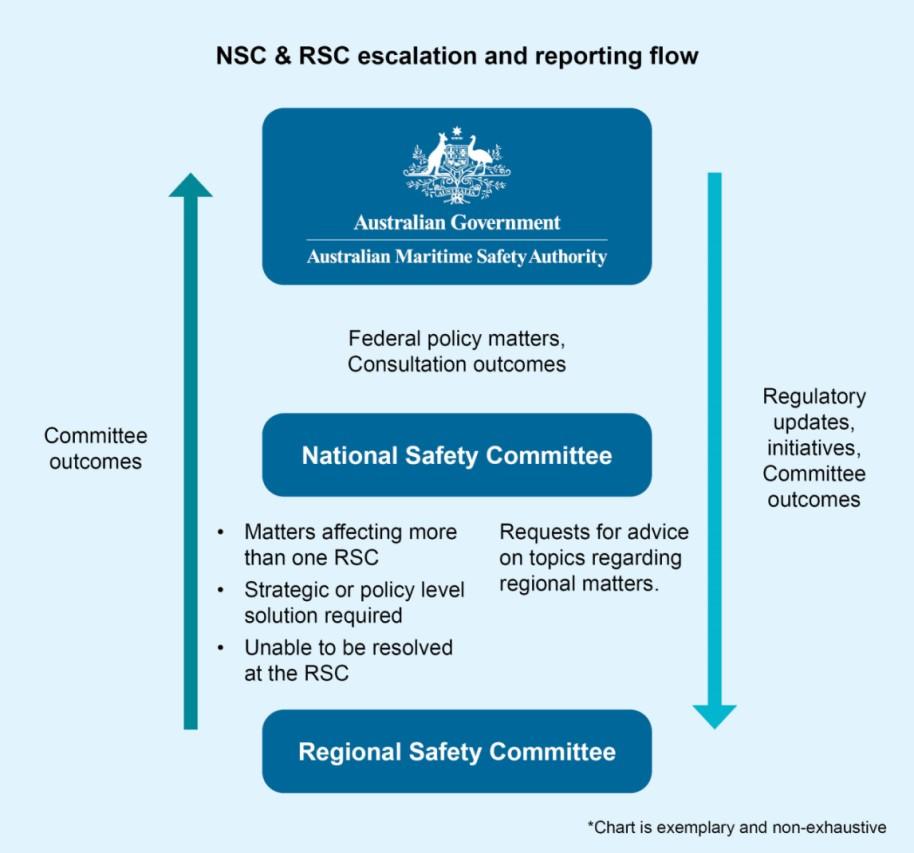Download the formal Terms of Reference document PDF196.65 KB on our website.
Overview
The committees:
- provide a forum for industry to take the lead in advising to AMSA to improve safety and regulatory performance, and for AMSA to update industry on relevant matters.
- discuss vessel and operational safety matters; regulatory proposals, standards changes, and safety and education initiatives. The committees also complement the formal consultation activities periodically conducted by AMSA.
- are not decision-making bodies. AMSA considers the advice of the committees as a part of its regulatory development activities.
- aim to foster an inclusive, diverse culture by championing efforts to improve gender equity, indigenous representation, social inclusion and accessibility outcomes in the maritime industry.
NSC primary functions | RSC primary functions |
|---|---|
a. Discuss strategic and current challenges in the context of Australian Government policy to:
b. Consider issues escalated by RSCs. c. Advise AMSA on matters within its regulatory remit. | a. Inform AMSA and regional regulators of trends and initiatives that may contribute to safety outcomes or enhance compliance. b. Provide advice to AMSA on matters within its regulatory remit. c. Provide feedback to AMSA on its National Compliance Plan and other associated compliance activities. d. Report outcomes and refer matters of national significance to the NSC. |
Governance and structure
The committees each comprise a Chair, Secretariat, members, observers and guests (as appropriate). AMSA provides support to the Chair and Secretariat to assist with the operation of the committees.
A review of each committee's Terms of Reference, composition and effectiveness takes place every 2 years.
The RSCs report to the NSC. (See also Figure 1). Issues are escalated from an RSC to the NSC are when:
- trends affect more than one jurisdiction or RSC
- an issue requires a strategic or policy level solution
- a matter cannot be resolved at the RSC level.

Membership
Members are expected to represent the views of their specific industry segment by consulting their stakeholders and presenting a consolidated position to the committees.
Committee composition seeks to represent an experientially and geographically diverse range of stakeholders from domestic commercial vessel operations and related industries.
RSC-specific membership
Representatives seeking membership to the RSC may apply through our online form at any time.
NSC-specific membership
AMSA will invite expressions of interest (EOI) to become a member of the NSC. These must be received by the due date and in the format specified in the invitation, late submissions will not be accepted. Existing members are eligible to reapply. Submissions are via our online form.
The Chair’s decision on the proposed member list is final.
Members selected to the NSC will serve a 2-year fixed term. An NSC member may serve less than the standard 2-year tenure if the member tenders their written resignation to the Chair or is released or terminated at the discretion of the Chair.
More detail is available in the Terms of Reference PDF196.65 KB.

Meetings for each committee are held twice-yearly, by virtual or hybrid arrangement.
The Chair may arrange inter-sessional meetings to progress specific work packages.
Committee members are required to book and pay for all travel and associated costs to participate in meetings. AMSA will meet all venue and meeting costs.
The Secretariat drafts meeting agendas, in consultation with the Chair and members.
All papers are to be submitted to the Secretariat for consideration and approval by the Chair by the due date advised by the Secretariat. Late submissions will only be accepted on approval of the Chair. Hard copies are not provided.
Any presentations are to be provided to the Secretariat for circulation to members.
A summary of outcomes will be recorded by the Secretariat to be emailed to members after the meeting for consultation and endorsement by members.
The Chair welcomes for consideration member comments and suggested edits. They formalise a final version at the subsequent meeting.
The endorsed summaries from each committee will be made publicly available.